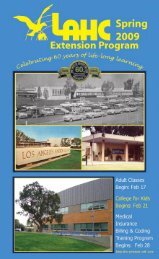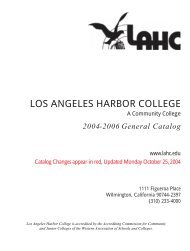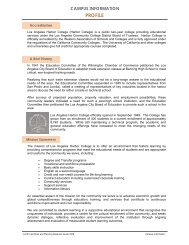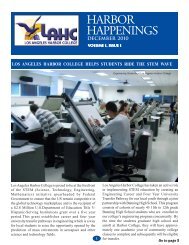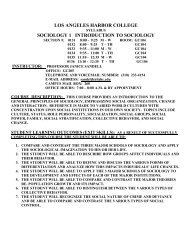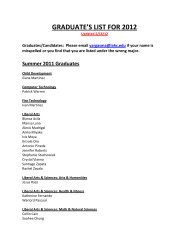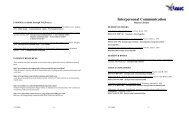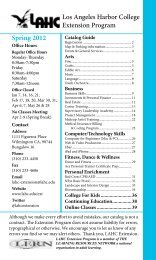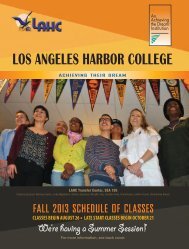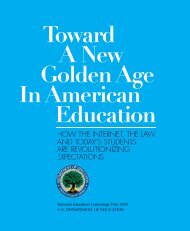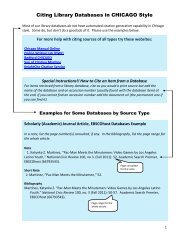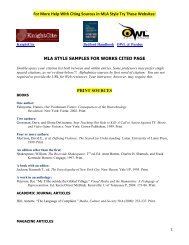Download File - Los Angeles Harbor College
Download File - Los Angeles Harbor College
Download File - Los Angeles Harbor College
Create successful ePaper yourself
Turn your PDF publications into a flip-book with our unique Google optimized e-Paper software.
ELECTRONICS<br />
Enrollment in and successful completion of Computer<br />
Technology 60 and 61, or Engineering Technology 49<br />
and 50 and Electronics 16 could increase performance in<br />
Electronics classes.<br />
4 - FUNDAMENTALS OF ELECTRONICS I<br />
(4 UNITS) CSU<br />
This course presents the theory and application of direct<br />
current (DC) circuit analysis for series, parallel and<br />
complex circuits. Ohms Law, Kirchoff’s and network<br />
theorem analysis are emphasized in conjunction with<br />
resistive, capacitive, inductive and magnetic properties<br />
associated with combinational DC Circuit Analysis. A<br />
3-hour per week laboratory accompanies the 3-hour lecture<br />
per week, in order to reinforce lecture and textbook theory<br />
and applications. Students prepare technical reports on<br />
their laboratory experiences. This course familiarizes<br />
students with basic test measuring equipment.<br />
5 - FUNDAMENTALS OF ELECTRONICS I<br />
LABORATORY (1 UNIT) CSU<br />
Prerequisite: Completion of Electronics 004 with a grade of “C” or<br />
better.<br />
This course analyzes the basic laws of electronics through<br />
self-paced study laboratory procedures. The student<br />
performs laboratory investigations of network theorems<br />
using such test equipment as volt-ohm-amperes meters,<br />
DVM and D.C power supplies and submits written lab<br />
reports. Analytical investigations of R/C and R/L time<br />
constant circuits are also included.<br />
6 - FUNDAMENTALS OF ELECTRONIC II<br />
(4 UNITS) CSU<br />
Prerequisite: Completion of Electronics 004 and Electronics 016 with<br />
grades of “C” or better.<br />
This course gives a detailed study of alternating current<br />
theory and applications (through lecture, discussion, and<br />
laboratory). The following topics are stressed: reactance,<br />
impedance, filtering and amplification gains and losses,<br />
admittance, resonance, and transformers. The emphasis is<br />
on solution of alternating current circuit problems using<br />
basic circuit theorems. In addition, student generated<br />
technical reports are emphasized. This course prepares<br />
the student for the study of solid-state circuitry.<br />
7 - FUNDAMENTALS OF ELECTRONICS II<br />
LABORATORY (1 UNIT) CSU<br />
Prerequisite: Completion of Electronics 006 with a grade of “C” or<br />
better.<br />
This laboratory course provides additional self-paced<br />
experimental study of alternating current theory in<br />
Electronics 6. Experiments ate performed with such test<br />
equipment as signal generators, time-base oscilloscopes,<br />
impedance bridge, EVM, and AC RMS meters.<br />
10 - MATHEMATICS OF ELECTRONICS I<br />
(3 UNITS) CSU<br />
This course is an introduction to mathematics as applied<br />
to basic electronics. Topics include whole numbers,<br />
fractions, ratios and percents, decimals, word problems<br />
and introduction to the scientific or engineering calculator.<br />
Operations involving addition, subtraction, multiplication,<br />
division, rounding and estimation are included.<br />
16 - SELECTED ELEMENTS OF ELECTRONICS<br />
MATHEMATICS (5 UNITS) CSU<br />
Prerequisite: Completion of Engineering Technology 049 with a grade<br />
of “C” or better.<br />
This course in electronic mathematics covers a review<br />
of algebraic concepts, powers of ten and scientific<br />
notation, metric system, algebraic expressions, algebraic<br />
equations, factoring equations containing fractions,<br />
function notations, graphing, special products and factors,<br />
exponents and radicals, quadratic equations, logarithmic<br />
equations, exponential equations, angles, complex<br />
numbers, triangles, trigonometric functions, solution of<br />
right triangles, trigonometric identities, phasors, complex<br />
operator, phasor algebra and applications of math to<br />
electronics.<br />
17 - CALCULUS FOR ELECTRONICS (5 UNITS)<br />
CSU<br />
Prerequisite: Completion of Electronics 006 and Electronics 016 with<br />
grades of “C” or better.<br />
This is an applied course using selected topics from<br />
analytic geometry and calculus with emphasis on<br />
electronic applications. Functional and average rate<br />
notations are developed to introduce basic derivatives and<br />
integrals. Applications of differentiation and integration<br />
of algebraic, trigonometric, logarithmic, and exponential<br />
functions are stressed.<br />
20 - ELECTRONIC CIRCUITS I (4 UNITS) CSU<br />
Recommended: Concurrent enrollment in Engineering Technology 049.<br />
This course introduces basic direct current circuit analysis<br />
fundamentals to students entering the field of computer<br />
technology. Lecture presents DC concepts through series<br />
132 * Course Descriptions <strong>Los</strong> <strong>Angeles</strong> <strong>Harbor</strong> <strong>College</strong>



